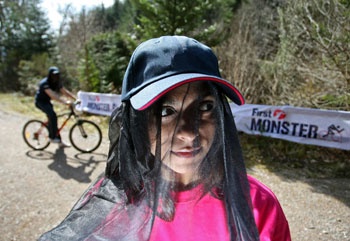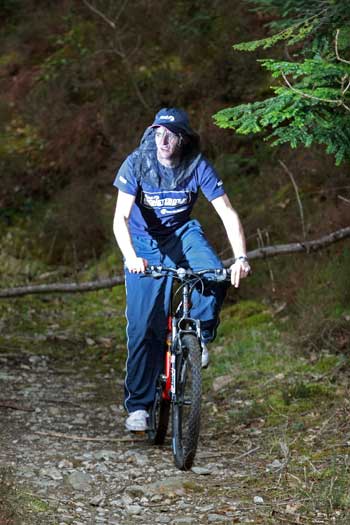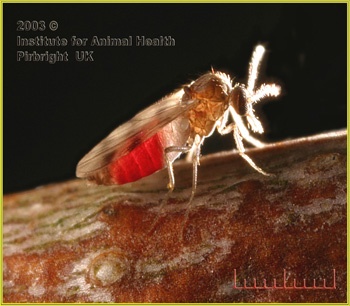FirstGroup, the world’s leading transport company, announced today that is has joined forces with the University of Aberdeen to hold an enormous scientific survey, and trial in the search for ways of combating the dreaded midge. Up to 1000 volunteers will help do battle with the millions of pests that notoriously blight Scotland in the Summer!
The University has invented a revolutionary new product which it hopes the trial will prove is the most effective weapon in the war against the midge.
On September 13th, FirstGroup will for the second time host its First Monster Challenge, a 120km duathlon (that’s running and cycling) around the shores of Loch Ness, Inverness in the Highlands of Scotland. At the inaugural event in 2007, competitor feedback was almost exclusively positive, except for the nuisance and irritation of midges at one point on the course.
One poor participant suffered hundreds of bites.

Moir Lockhead, FirstGroup’s Chief Executive explains more: “The midges were a bit of a problem at one of our seven transition points in 2007. The weather conditions were ripe for midges, and added to which the increased levels of carbon dioxide from our competitor’s heavy breathing, is unfortunately one of the key elements that attracts midges to humans.
“We are striving to make the 2008 First Monster Challenge even better than 2007,” he added.
“Consequently, we have teamed up with the University of Aberdeen to trial techniques aimed at safeguarding the health and sanity of our participants!”

Jenny Mordue is a Professor in the Department of Zoology and an expert in pest control and the behaviour of midges.
“The First Monster Challenge provides a unique opportunity to use competitors as volunteers in our work aimed at protecting people from bites,” said Professor Mordue, who has spent many years collaborating with Rothamsted Research Institute on the research.
“The extra carbon dioxide produced by the competitors will certainly encourage midges to attack participants, but also gives us the chance to conduct a monster trial in the age old battle between man and midge.
"In a previous test we estimated that in the right conditions up to 40,000 midges can land on an unprotected arm in one hour!”
Professor Mordue will conduct an experiment at the September 13 First Monster Duathlon.
Trials will take place using a new midge repellent based on natural chemicals discovered by partners, the University of Aberdeen and Rothamsted Research, and formulated as a puffer repellent’ by Atrium Innovation.
This is the first trial of its kind in what researchers hope will be the most effective ever invention to combat the midge.

Two tents will be used to test the repellent. One tent incorporates an electric ‘killing grid’ that burns midges as they try to enter and allows the researchers to count the number of midges trying to get in.
All competitors will be asked to complete a short questionnaire regarding their attractiveness to midges that will be used to define range of attractiveness across a very large number of people.
This will include susceptibility to midge bites and the degree of susceptibility compared to family/friends.
Professor Mordue went on to explain that if successful the puffer repellent will be followed by new creams and lotions and even specially designed impregnated clothing or badges, all of which will use the same ingredients providing the user with complete protection from the menace of the midge.
“I am looking forward to using volunteers from the First Monster Challenge as guinea pigs on September 13th,” added the Professor.
“We have already proved the widely held belief that some people are more attractive to the midge that others. We have identified naturally occurring chemicals produced by those people that are less attractive to midges that actually repel midges from people who are usually bitten.
"And now we will supply these in the tent through the repellent spray. I am confident the results form the experiment and survey will help shape and develop our strategies on how best to combat the midge. If all goes well, we will finally have a solution in the battle to protect people from the dreaded midge.”
The midge typically hatches around April / May and is at its most dangerous in the summer months.
The midge is found in Scotland and Northern Europe and is an ongoing threat to the Scottish Tourist Industry as ‘Mr Loch Ness’, Willie Cameron, a Loch Ness tourism expert explains: “The dreaded midge has been the scourge of millions of tourists to Scotland. A report a few years ago estimated that the midge cost the economy in the region of £280m every year. If we could all but eradicate the midge, or at least better protect people, we can attract even more tourists to what is unquestionably the most amazing and stunning location in the UK.”
The First Monster Challenge takes place on 13th September around the shores of Loch Ness. In teams of four each competitor is required to complete two legs of the eight-legged event - one 20km cycle and one 10km run. To sign up for the First Monster Challenge or for more information, log on to www.firstmonster.com. Celebrities Nell McAndrew and Ben Fogel have already committed to take on the Monster Challenge and along with the other competitors are urged to raise money for First’s charity partners, Save the Children.


